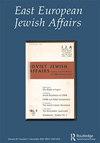The Book Smugglers: partisans, poets, and the race to save Jewish treasures from the Nazis
IF 0.2
4区 哲学
Q2 HISTORY
引用次数: 0
Abstract
he spent the remaining decades of his life (he died in 1971). He describes how he was urged to abandon his “anti-Soviet propaganda” because it allegedly besmirched the reputation of the USSR, the country that had stopped the Nazi advance and had supported establishment of the state of Israel. Notwithstanding, and unlike dozens of other former inmates who published their memoirs much later, Margolin did not succumb to pressure. He testified to Soviet crimes wherever could (for instance, at the Rousset libel trial in France in 1951), and he continued to write about the Gulag in his later publications. Margolin’s continued attempts to publish his manuscript in Israel, France, and the United States are noted in Timothy Snyder’s and Katherine R. Jolluck’s foreword and introduction to the English edition, as well as in the prefaces to earlier editions in other languages (the memoir was first published in French in 1949). Snyder highlights Margolin’s impatience with relativist approaches that essentially excused the Soviet system, and Jolluck adds interesting details concerning the philosopher’s postwar campaigning for the truth. This English edition, brought to press by Margolin’s son, Ephraim, and carefully translated by Stefani Hoffman, joins previous editions in Polish, German, and Hebrew that were published in the past decade. It also includes several additional chapters in a section titled “The Road to the West,” which detail Margolin’s re-emergence into the world of the living and his eventual return to Palestine. This was a journey in stages; among the depictions are those of Łódź, a city full of postwar ghosts, and a lively Paris, which Margolin described as greeting with his “toothless camp grin” (p. 554). From the time of his return to Palestine, Margolin felt a moral imperative to break through the wall of silence, sound an alarm, and “throw a lifebelt into the Soviet sea of injustice” (p. 576). While it is too late to alter the fate of Margolin’s fellow prisoners, this English edition of his memoir may play an important role in preserving the memory of millions of people of various nationalities and religions who perished in the Gulag – people who, “concealed from the human eye and human judgment,” (p. 525) had come to think that the outside world was nothing more than a dream.书籍走私者:游击队员、诗人和从纳粹手中拯救犹太珍宝的竞赛
他度过了他生命的最后几十年(他于1971年去世)。他描述了他是如何被敦促放弃“反苏宣传”的,因为它据称玷污了苏联的声誉,而苏联曾阻止过纳粹的前进,并支持建立以色列国。尽管如此,与其他几十名在很久之后才出版回忆录的前囚犯不同,马戈林并没有屈服于压力。他在任何可能的地方为苏联的罪行作证(例如,1951年在法国的鲁塞诽谤审判中),他在后来的出版物中继续写关于古拉格的文章。马戈林继续尝试在以色列、法国和美国出版他的手稿,这在蒂莫西·斯奈德和凯瑟琳·r·乔勒克的英文版前言和介绍中都有记载,在其他语言的早期版本的前言中也有记载(这本回忆录于1949年首次以法语出版)。斯奈德强调了马戈林对相对主义方法的缺乏耐心,这种方法本质上是为苏联制度开脱的,而乔勒克则添加了这位哲学家在战后为真相而战的有趣细节。这本英文版由马戈林的儿子以法莲(Ephraim)出版,斯特凡尼·霍夫曼(Stefani Hoffman)精心翻译,加入了过去十年出版的波兰语、德语和希伯来语版本。书中还有一个名为“通往西方的路”的章节,其中详细描述了马戈林如何重新出现在现实世界中,并最终回到巴勒斯坦。这是一段分阶段的旅程;在这些描写中,有Łódź,一个充满战后鬼魂的城市,还有一个充满活力的巴黎,马戈兰形容巴黎是用他“没有牙齿的营地笑容”问候的(第554页)。从他回到巴勒斯坦的那一刻起,马戈林就感觉到一种道义上的责任,那就是打破沉默之墙,发出警报,“向苏联不公正的海洋扔一条救生带”(第576页)。虽然现在改变马戈林的囚犯同伴的命运已经太迟了,但他的这本回忆录的英文版可能在保存数百万不同国籍和宗教的人在古拉格死亡的记忆方面发挥了重要作用——这些人“隐藏在人类的眼睛和人类的判断之外”(第525页),他们开始认为外面的世界只不过是一个梦。
本文章由计算机程序翻译,如有差异,请以英文原文为准。
求助全文
约1分钟内获得全文
求助全文

 求助内容:
求助内容: 应助结果提醒方式:
应助结果提醒方式:


